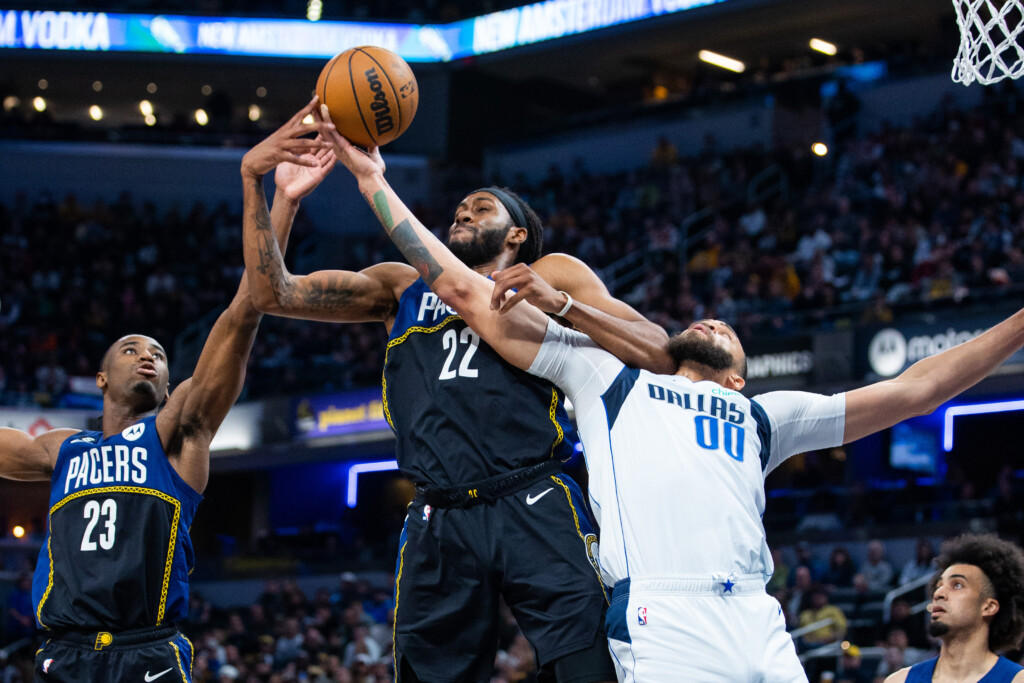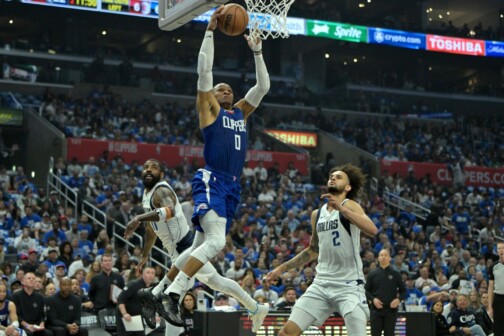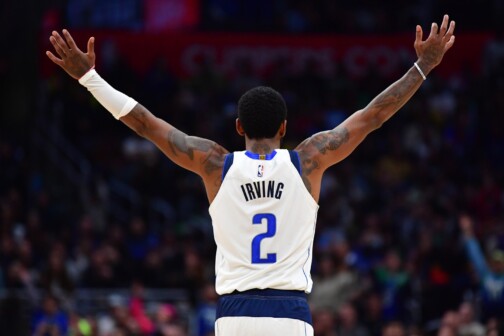The Mavericks’ season ended on Sunday with a game of losing chess, as both Dallas and the San Antonio Spurs were motivated to lose in order to improve their lottery odds. The inability to get stops, something that haunted the Mavericks all season long, finally paid off in this one. A cast-of-end of bench players fell behind 42-14 after one quarter and allowed 138 points to the lowly Spurs, increasing their odds for a top-10 pick in the 2023 draft significantly.
This was the final act in what was a culmination of several weeks of embarrassing moments for a franchise that opened the 2022-23 campaign coming off a Western Conference finals run and high playoffs aspirations. How did it get so bad?
It starts with the man in charge of the team strategy failing to build a competitive roster. Mark Cuban’s media session last Wednesday made it abundantly clear he’s still the one calling the shots and thus should bear the brunt of the responsibility.
Next in line is Jason Kidd, who failed to establish chemistry, structure, rotations, and schemes to rally the team when things got tough. There was plenty of sample size, too: the Mavericks led the NBA in both clutch games (55) and clutch losses (29).
It ends with the superstar. Luka Doncic failed to steer the wagon in the right direction—or, more accurately, he got tired pulling it out of the mud for the first four months of the season, before the losing and the frustration started to pile up. It was another painful maturity test for the 24-year-old, who often unleashed his frustration on the refs or his teammates.
But while the latter two problems raise legitimate questions—about Kidd’s coaching and Doncic’s maturity—they were heavily influenced by the initial one. It was a poorly constructed roster and a heavy load that led to Doncic’s frustrations, and what prevented Kidd from coaching the brand of basketball and especially the defense he prefers.
Which is why one Cuban comment, in particular, caught my attention.
Mark Cuban: "I don’t think it’s Kidd’s problem that we didn’t have an identity. ... The game changed in ways we didn’t expect it to change, so I blew it. It was on me, personally, because the game changed in terms of the take foul and the speed of the game."
— tim cato (@tim_cato) April 5, 2023
Why did this make me raise my eyebrows? Because it’s not the first time the Mavericks have put themselves behind the eight-ball. They have been chasing the NBA when it comes to how the game is evolving ever since Doncic arrived in 2018.
Before we dig deeper, let’s address the evident part. The Mavericks have their foundational piece in Doncic, and it is clear what he brings to the table. He’s an offensive dynamo, one who delivers elite half-court offense. Despite numerous breakdowns Dallas finished the season as the best half-court offense in the NBA. (The Mavs finished second, fifth, and first in the previous three seasons.) The backbone of that is Doncic’s ability to manipulate the pick-and-roll, drive the ball, and either finish at the rim at an elite rate or create quality three-point looks for his teammates. (Dallas finished top five in three-point frequency in each of the last five seasons and had the highest corner three-point frequency rate in the history of the league this year.) How to build around that foundation is where things get tricky and where the Mavericks’ failures originated.
To identify the biggest issue, the Mavericks just have to look in the mirror. Defense, or lack thereof, was the main cause for each of the last three playoff exits and for the mess this season became. Cuban took the hit for not recognizing what personnel changes were needed, yet the Mavericks traded for Kyrie Irving even as they were already sliding full speed to the defensive cellar of the NBA. Brilliant as Irving is offensively, he epitomizes the flawed logic of pursuing stars who can fill the scoreboard regardless of the fit on the other end of the floor.
Sound familiar? Most of the Mavericks’ recent moves went in the opposite direction of where the NBA was evolving and compromised any attempt at building a competent defense. They traded for Kristaps Porzingis expecting him to be a defensive anchor at a time when the league was already moving away from the drop coverage (more on that later). When Kidd and his staff found ways to utilize Porzingis as a weak-side help defender last season, the Mavericks shipped him out in exchange for two sub-par defenders in Spencer Dinwiddie and Davis Bertans. They re-signed Tim Hardaway Jr. and traded for Christian Wood, both below-average defenders. There were failed experiments with JaVale McGee and Kemba Walker, who couldn’t stay in front of anybody. Finally, the addition of Irving came at the expense of losing Dorian Finney-Smith, their last remaining wing defender with the length and athleticism required for modern NBA defense. The Mavericks’ allergy to defense is not new; it has been like this for more than a decade. Since Tyson Chandler anchored the defense (and finished third in Defensive Player of the Year voting) on the 2011 title team, no Maverick has even sniffed an All-Defensive team. In fact, the 21 All-Defensive votes received by Mavericks players in the last 11 years combined would not be enough to put one of them on the team.
The change of pace hit the Mavericks in the face, but not on offense or transition like Cuban suggested. Rather, it was on the other end of the floor. The NBA’s scoring explosion is the consequence of increased skill, better decision-making, and added shooting at all positions. There is more ground to cover. More rotations have to be made (tilting, gaping, zoning if you’re into X-and-O jargon). Teams need length, lateral speed and athleticism to have any chance of making stops on a consistent basis. They need elite defenders, be it players who can disrupt on the ball (think Dillon Brooks or Luguentz Dort), who help in the gaps (Herb Jones or Alex Caruso), who switch (Jaden McDaniels or Jarred Vanderbilt), or who protect the rim (Robert Williams III or Nic Claxton). The best defensive teams—Memphis, Milwaukee, Boston, and Cleveland—have difference makers in several areas. The Mavericks have none. I used those names, instead of more distinguished ones like Jaren Jackson Jr., Bam Adebayo or Jrue Holiday, intentionally because none of them was selected higher than 27th in the NBA Draft. Smart teams can find these players.
And in years past, the Mavericks have; Finney-Smith and Maxi Kleber both went undrafted, after all. But they haven’t identified any new ones in the last six years. Josh Green is the closest they’ve come, and while he can disrupt with athleticism, he lacks the length and experience to defend the game’s best wing scorers. That’s nowhere near enough to offset Finney-Smith’s departure plus Kleber and Reggie Bullock’s regression.
The roster being void of size, length, and athleticism across all positions is not a coincidence. It’s a choice and a consequence of priorities being elsewhere for a long time.
After the trade deadline, I analyzed how the 6-foot-2 Irving made an already small team one of the tiniest in the league. Playing so small not only hurt the Mavericks on defense. It also crippled them on the glass. Dallas was the worst offensive rebounding team all season long, and after the trade deadline, they fell to last place at allowing opponent’s second-chance points.
As was the case with defense, the Mavericks have never valued or prioritized rebounding, especially crashing the boards on offense. They finished in the bottom third in the NBA in offensive rebounding in 12 of the last 14 seasons. To be fair, the offensive rebound rate around the league was in decline from 2012 until 2021. But when the trend changed this season, the Mavericks didn’t adapt.
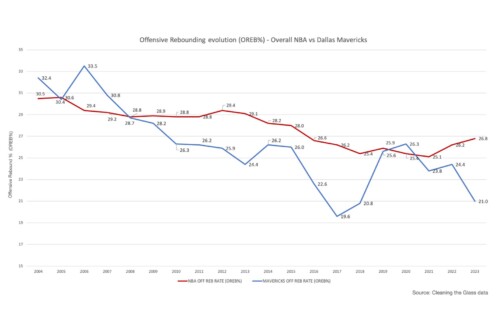
The rise of offensive rebounding is correlated to the Mavericks’ initial problem: getting stops and playing defense antithetical to how the rest of the NBA is evolving. The league has gotten more skilled and more agile, so switching replaced drop as the predominant pick-and-roll coverage over the course of the last two seasons.
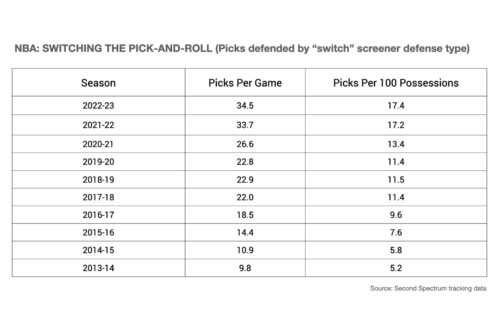
On a recent Thinking Basketball podcast, former NBA coach Stan Van Gundy explained why offensive rebounding is on the rise. It’s because of all that switching. Apart from the various schematic things teams can do to punish the switch, they need to be able to attack the offensive glass once bigs are defending the ball away from the basket. And if I asked you against which team opposing defense switches the most, you won’t have to think hard. It’s the worst offensive-rebounding team in the NBA, your Dallas Mavericks.
Switching is hurting the Mavericks on both ends of the court. Even with below-average defense and no paint protection, the offense was explosive enough to win the half-court battle most of the time (in 51 of 82 games, to be exact). But the Mavericks were too small to punish the switch by crashing the boards, while their opponents feasted on second chances once the smallish Mavericks found themselves cross-matched on the other end.
Circling back to my point of Doncic as being the foundational piece to build around: he’ll always be an offensive force, but it’s evident he needs help on the margins. Running more to get easy transition buckets sound enticing, but is probably never going to be a thing on a Doncic-led team, nor is it his strength. Getting that elite half-court attack more second chances should be, and it would push the offense into top-three territory overall. Combine that with an average defense, and you get a contender in the mold of the Denver Nuggets.
Hopefully hitting rock bottom will force the Mavericks into a paradigm shift: after a decade of neglect, they need to prioritize defense and rebounding. The last time the Mavericks followed the blueprint of surrounding their superstar with elite defensive talent, it got them their only Larry O’Brien Championship Trophy. Of course, reshaping the defense would be a lot easier if Doncic would try more. It’s not like he can’t; in recent games against the Heat and the Hawks, he showed he can defend when pride is on the line. Re-signing Irving is the offseason priority, and while he can unlock the offense even more, his size makes the task of fixing the defense and addressing the rebounding only harder. How the Irving situation unfolds, what the Mavericks do with a potential top-10 draft pick, and what other moves they make in the offseason will tell us if they’re serious about flipping the script when it comes to smart team building around Doncic. They might not get another chance.
Get the ItList Newsletter
Author



